Astronomy

 Some Qur'aanic Verses & Astronomical
Discoveries Some Qur'aanic Verses & Astronomical
Discoveries
 Facts From Astronomy Facts From Astronomy
Some
Qur'aanic Verses & Astronomical discoveries
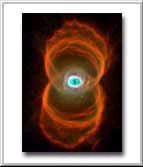 Professor Yoshihide Kozai: I say, I am very much
impressed by finding true astronomical facts in the Qur'aan. Professor Yoshihide Kozai: I say, I am very much
impressed by finding true astronomical facts in the Qur'aan.
Dr. Kozai is Professor Emeritus at Tokyo
University, Hongo, Tokyo, Japan, and was the Director of the National Astronomical
Observatory, Mikata, Tokyo Japan. We presented to him a number of Qur'aanic verses
describing the beginning of creation and the heavens, and which deal with the relationship
of the earth to the heavens. After studying these verses, Professor Kozai asked us
about the Qur'aan and about the time when the Qur'aan was revealed. We informed him that
it was revealed 1400 years ago, and then we asked him about the facts which these verses
contained. After each answer we would show him the Qur'aanic text. He expressed his
astonishment, saying that this Qur'aan describes the universe as seen from the
highest point, everything seen is distinct and clear. He who said this sees everything in
existence. Seen from such a point, there is nothing which can be unseen.
We asked him whether at some point in time the firmament
was in a form of smoke. He stated that all signs and indications are converging to
prove that at one point in time the whole firmament was nothing but a cloud of smoke. This
has come to be established as a proven visible fact. Scientists now can observe new
stars forming up out of that smoke, which is the origin of our universe, as we see in this
picture (Figure 17.1).
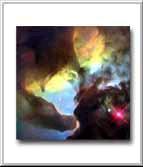
Fig. 17.1
This picture was obtained only recently with
the help of the spaceship. It shows one of the stars as it forms up out of the smoke. Look
at the outer reddish parts of the smoke as it begins to heat and cluster. And look
at the center of the cloud and how the smoky matter is of such high density that it
becomes irradiant. The illuminating stars we see today were, just as was the whole
universe, in that smoke form. We presented to him the Qur'aanic verse saying:
Then
he turned to the sky, and it had been (as) smoke (dukhaan): He said to it and to the
earth: come you together, willingly or unwillingly. They said: we do come (together) in
willing obedience. (Qur'aan 41:11).
Some scientists describe this dukhaan or smoke
“mist”. But Professor Kozai pointed out that the term
“mist” does not correspond to the description of this smoke, because mist is
characteristically cold, whereas this cosmic smoke is somewhat hot. Dukhaan indeed is made
up of diffused gases to which solid substances are attached, and this is the exact
description of the smoke from which the universe emerged even before the stars were
formed. Professor Kozai said that because that smoke was hot, we cannot describe it as
“mist”. Dukhaan is the best descriptive word that can ever be. In this way Professor
Kozai continued to scrutinize each Qur'aanic verse we presented to him.

17.2
Finally we asked him: ‘What do you think
of this phenomenon which you have seen for yourself, namely, that science is beginning to
discover the secrets of the universe, whereas many of these secrets have already been
revealed in the Qur'aan or in the Sunnah? Do you think that the Qur'aan was given to the Prophet
Muhammad peace be upon him (sallAllahu ‘alaihi wa sallam) from a human
source?’
Professor Kozai replied: "I say, I
am very much impressed by finding true astronomical facts in Qur'aan, and for us
modern astronomers have been studying a very small piece of the universe. We have
concentrated our efforts for understanding of a very small part. Because by using
telescopes, we can see only very few parts of the sky without thinking about the whole
universe. So, by reading Qur'aan and by answering to the questions, I think I can
find my future way for investigation of the universe."
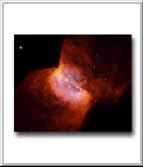
Fig. 17.3
Professor Kozai believes it is
impossible that the Qur'aan was from a human source. He further stated that we scientists
in our studies concentrated only on a small area, but if we read the Qur'aan, then we will
see a much larger picture of this universe. Scientists have to look at it in a panorama,
not within limited and narrow perspectives. Professor Kozai acknowledges relating
to the Cosmos, he is now able to define his way in the future. He states that, from
now on, he will plan his research guided by the comprehensive Qur'aanic view of the
universe.
Glory to You O Lord, may You be exalted! This
is the ever-lasting miracle which renews itself. This is a miracle which gives life and
which convinces Muslims and Non-Muslims, and which will convince all generations until the
Day of Judgment. Allah Almighty said in the Qur'aan:
But Allah bears
witness that what He has sent unto thee He has sent with His (own) knowledge.
(Qur'aan 4:166).
And say: Praise be to
Allah, Who will soon show you His signs, so that you shall know them. (Qur'aan
27:93).
Facts
From Astronomy
 Allah
Almighty has made clear to us that His book, the Qur'aan has been revealed as a
reminder to the whole world. Allah
Almighty has made clear to us that His book, the Qur'aan has been revealed as a
reminder to the whole world.
Allah Almighty said: This is no less than a reminder to (all) the worlds. And you shall
certainly know the truth of it (all) after a while. (Qur'aan 38:87-88).
Thus, the Qur'aan is a reminder for all of
mankind until the Last Hour. It contains information that man discovers in due time.
Because this Qur'aan was revealed from Allah Almighty's knowledge and every single
verse in it was revealed with Allah Almighty's knowledge, as He Himself said:
But
Allah bears witness that what He has sent unto you He has sent with His (own) knowledge...
(Qur'aan 4:166).
Every single verse contains divine knowledge,
but mankind is constantly developing. In attaining higher levels of scientific
understanding, mankind is then capable of discerning the divine knowledge contained in
a given verse. Thus, coming to know that this verse has been revealed from Allah
Almighty, with the ever continuing process of human progress and development, man will
come to find the clue that enables him to understand another verse, and so on. In this way
mankind will continue to understand more and more verses. This is the wondrous
characteristics of the Qur'aan.
Professor Armstrong works at NASA,
otherwise known as the National Aeronautics and Space Administration, where he is a
well-known scientist there. We met him and asked a number of questions about Qur'aanic
verses dealing with the expertise in Astronomy. We asked him about iron and how it was
formed. He explained how all the elements in the earth were formed. He stated that the
scientists have come only recently to discover the relevant facts about that formation
process. He said that the energy of the early solar system was not sufficient enough to
produce elemental iron.
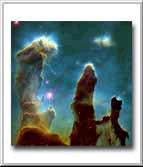
Fig. 16.1 Eagle Nebula
In calculating the energy required to form one
atom of iron, it was found to be about four times as much as the energy of the entire
solar system. In other words, the entire energy of the earth or the moon or the planet
Mars or any other planet is not sufficient to form one new atom of iron, even the energy
of the entire solar system is not sufficient for that. That is why Professor Armstrong
said that the scientists believe that iron is an extraterrestrial that was sent to earth
and not formed therein. We read to him the Qur'aanic verse saying:
And
we sent down Iron, in which is Great might, as well as many benefits for mankind.
(Qur'aan 57-25).
Then we asked him about the sky and whether it
had any gaps or rifts in it. He disproved this and replied that what we are talking about
is a branch of astronomy called the Integrated Cosmos which we scientists have only
come to know recently. For example, if you have a body in outer space which travels a
certain distance in any direction and then travel the same distance in a different
direction, you will find that the mass weight is the same in all directions. Because this
body has its own equilibrium, the pressures from all directions are the same. Without this
equilibrium, the whole universe would collapse. I recalled Allah Almighty's
verse in the Qur'aan:
Do
they not look at the sky above them? How we have made it and adorned it, and there are no
flaws in it? (Qur'aan 50:6).
Then we talked to Professor Armstrong
about the attempts of scientists to reach the edge of the universe, and we asked him
whether they were successful in this. He replied that they are fighting an uphill battle
to the edge of the universe. We construct more powerful equipment to observe the universe
only to discover that the new stars we see are still within our galaxy and that we have
not yet reached the edge of the universe. He is aware of the Qur'aanic verse which
says: And we adorned the lowest heaven with lamps and we
made such (lamps) missiles to drive away satans. (Qur'aan 67:5).
Indeed, all these stars are adornments for the
lowest heaven. He says that scientists have not reached the end of the universe.
Professor Armstrong added that because of this, they are thinking of stationing more
telescopes in outer space so that their observations will not be obstructed by dust and
other atmospheric impediments. Vision telescopes using light are unable to travel
long distances, so we replaced them with radio operated ones enabling us to see further,
but we nevertheless are still within the boundaries. I mentioned to him this verse:
So turn thy vision
again: Do you see any flaw? Again turn your vision a second time: (your) vision will come
back to you dull and discomfited, in a state worn out. (Qur'aan 67:3-4).
Each time Professor Armstrong told us
some scientific fact, we mentioned to him the relevant verse which he agreed with. Then we
said to him: You have seen and discovered for yourself the true nature of modern astronomy
by means of modern equipment, rockets, and space ships, developed by man. You have also
seen how the same facts were mentioned by the Qur'aan 14 centuries ago, so what is
your opinion about these?
He replied: "That
is a difficult question which I have been thinking about since our discussions here. I am
impressed at how remarkably some of the ancient writings seem to correspond to modern and
recent astronomy. I am not a sufficient scholar of human history to project myself
completely and reliably into the circumstances that 1400 years ago would have
prevailed."
"Certainly, I would like
to leave it at that what we have seen is remarkable, it may or may not admit of scientific
explanation. There might have to be something beyond what we understand as ordinary
human experience to account for the writings that we have seen. It is not my intention or
my position at this point to provide an answer to that. I have said a lot of words
without, I think, expressing exactly what you want me to express, but it is my job as a
scientist to remain independent of certain questions and I think that is one of the
reasons that I had better stop just a little bit short of giving you the complete answer
that you might desire."
Yes, it is very difficult to imagine that this
knowledge revealed in the Book of Allah Almighty fourteen centuries ago could have
come to Prophet Muhammad peace be upon him (sallallahu alaihi wa sallam) from
a human source. There must be some other source from which scientists derive their
knowledge, because only Allah Almighty knows the secrets of the heavens and the
earth. As we have seen and heard from the various meetings with these scientists, we are
on the threshold of a new age.
This is an age where religion and science
can embrace, the true religion and the true science. Therefore, there can be no
contradiction whatsoever between the two, nor should there be any opposition. This is the
conclusion that Muslim scholars have arrived at throughout centuries. That is,
there is no possibility that a proven scientific fact could contradict a divinely revealed
truth which has been clearly understood. If they say we are in the space age, it is true,
it is the age where scientific knowledge and religion would agree, but this can only be
between true knowledge and the religion of Islam, which Allah Almighty has
preserved from all falsification and alteration.
 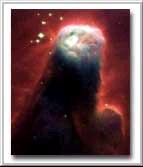
Fig. 16.2
|
|


![]()